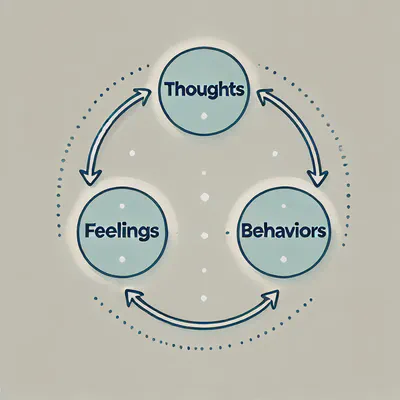Excel Psychology offers a variety of therapies across the spectrum of psychological approaches. This approach is aimed at ensuring each client’s unique needs and circumstances are navigated with the most up to date, effective, strategies available. By incorporating diverse methods, we can provide personalised treatment tailored to the individual client’s personality, challenges, and goals. At Excel Psychology, we recognise that individual people need individualised care, and by offering options like cognitive behavioural therapy (CBT), EMDR, and schema therapy, we aim to provide a comprehensive, tailored experience that fosters deeper healing and personal growth. All approaches we use are supported by science and backed by research, ensuring clients receive evidence-based care. Some of the therapies we offer are explained here:
Excel Psychology Therapies
Cognitive Behaviour Therapy (CBT)

Cognitive Behavioural Therapy (CBT) is a highly regarded, evidence-based approach that focuses on identifying and changing negative thought patterns and behaviours to improve emotional well-being. Considered the gold standard of therapy, CBT is effective in treating a range of mental health conditions, including anxiety and depression. By helping clients challenge distorted thinking and develop healthier coping mechanisms, CBT promotes lasting positive change in both thoughts and behaviours.
Acceptance and Commitment Therapy (ACT)
Acceptance and Commitment Therapy (ACT) emphasises accepting one’s thoughts and feelings without judgement, even when they are difficult or uncomfortable, rather than trying to eliminate, hide or avoid them. By encouraging individuals to clarify their personal values, ACT helps them choose a direction in life that aligns with what truly matters to them. Through committed action, clients learn to take meaningful steps toward their goals, working with challenges and fostering a more fulfilling and purpose-driven life.
Attachment-based therapy
Attachment-based therapy is based in attachment theory, which emphasises the importance of early relationships in shaping emotional development and interpersonal behaviour. This approach focuses on helping individuals understand how their early attachment experiences influence their current relationships and emotional patterns.
Cognitive Processing Therapy (CPT)
Cognitive Processing Therapy (CPT) is a structured, evidence-based approach designed to help individuals recover from trauma, particularly post-traumatic stress disorder (PTSD). It focuses on identifying and challenging maladaptive thoughts, or “stuck points,” that develop in response to traumatic experiences, which can hinder emotional healing. By addressing distorted beliefs, CPT helps clients process their trauma more effectively, leading to reduced symptoms and a healthier perspective on their experiences.
Dialectical Behaviour Therapy (DBT)
Dialectical Behaviour Therapy (DBT) is a highly effective, evidence-based treatment designed to help individuals manage intense emotions, improve relationships, and develop healthier coping strategies. It combines cognitive-behavioural techniques with mindfulness practices, with an emphasis on learning skills in emotional regulation, distress tolerance, interpersonal effectiveness, and acceptance. DBT is particularly beneficial for those with borderline personality disorder, self-harm behaviours, and chronic emotional dysregulation, providing tools and strategies for long-term emotional and behavioural stability.
Emotion Focused Therapy (EFT)
Emotion Focused Therapy (EFT) helps individuals better understand, process, and manage their emotions by focusing on the role emotions play in personal experiences and relationships. EFT aims to help individuals access and transform difficult emotions, fostering emotional healing and promoting healthier emotional expression.
Eye Movement Desensitization and Reprogramming (EMDR)
Eye Movement Desensitization and Reprogramming (EMDR) Eye Movement Desensitization and Reprocessing (EMDR) is a therapy that helps individuals process and heal from traumatic experiences by using guided eye movements or other forms of bilateral stimulation. EMDR helps rewire the brain’s response to trauma, reducing the emotional distress associated with traumatic memories and promoting psychological healing.
Interpersonal Therapy
Interpersonal Therapy (IPT) is a short-term therapy that focuses on improving interpersonal relationships and social functioning to help reduce psychological distress. It addresses issues like communication problems, unresolved grief, role transitions, and interpersonal conflicts that may contribute to depression and anxiety.
Motivational Interviewing
Motivational Interviewing is a client-centred approach designed to enhance an individual’s motivation to change by exploring and resolving ambivalence. Ambivalence can be problematic for clients because it creates an internal conflict between wanting to change and feeling resistant to the effort or consequences of that change, leading to inaction or self-sabotage. Motivational Interviewing empowers clients by helping them discover their own reasons for making positive changes, rather than relying on external pressure or direction.
Prolonged Exposure Therapy (PE)
Prolonged Exposure Therapy (PE) is a form of cognitive-behavioural therapy that helps individuals confront and process trauma-related memories and situations they have been avoiding. By gradually and repeatedly exposing individuals to these distressing memories or triggers, PE reduces the emotional power of the trauma and helps individuals regain control over their lives.
Schema Therapy
Schema Therapy is an integrative therapeutic approach that combines elements of cognitive-behavioural therapy (CBT), attachment theory, experiential and psychodynamic concepts to address deep-rooted emotional patterns, known as schemas. Formed in childhood, schemas influence current behaviour and relationships in unhealthy ways, leading to difficulties such as anxiety, depression, and interpersonal conflicts. The goal of schema therapy is to help clients identify and understand these maladaptive patterns, heal from past wounds, and develop healthier ways of thinking, feeling, and relating to others.









